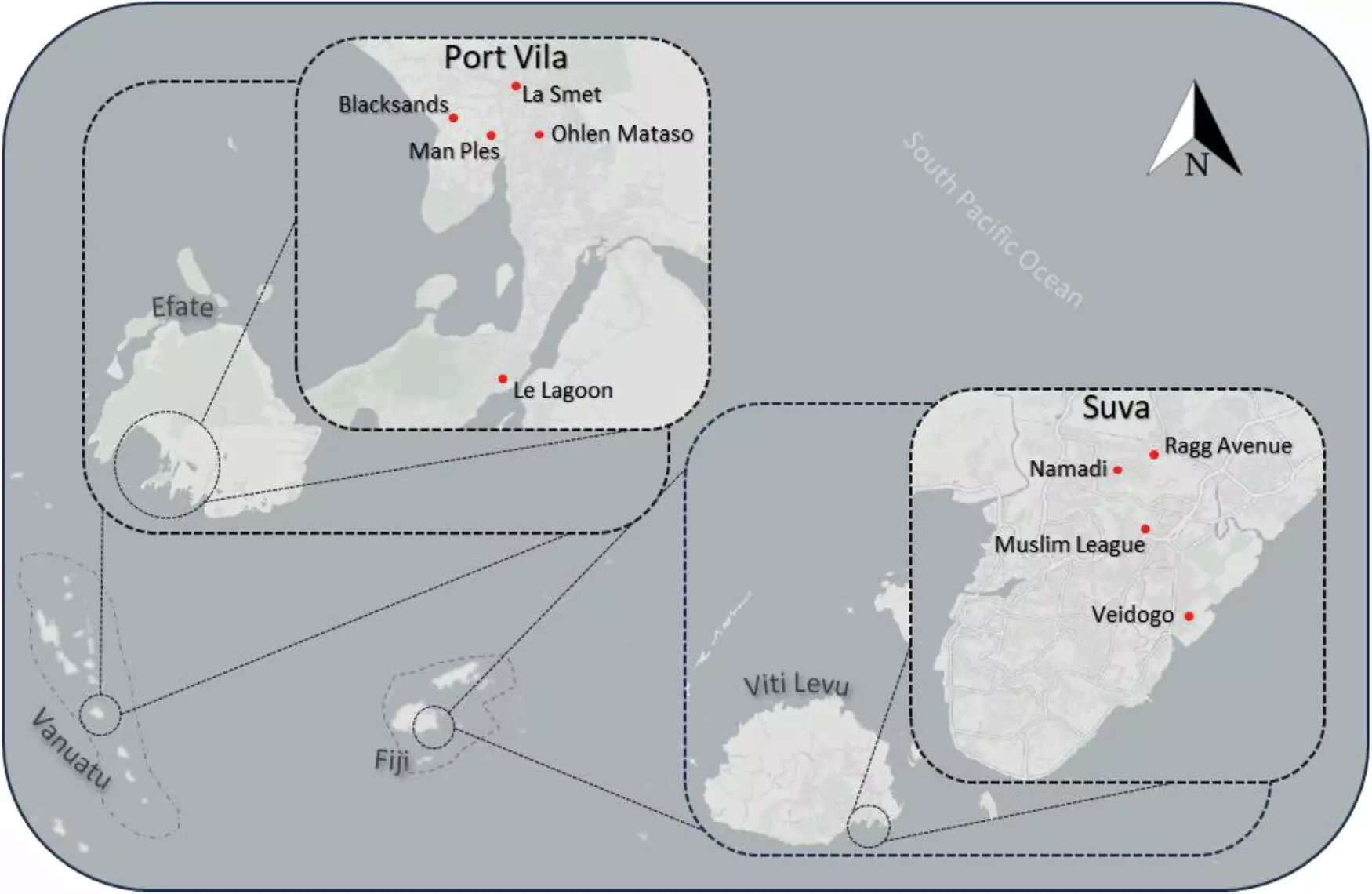The Pacific Islands are often romanticized as idyllic vacation spots with pristine beaches and lush vegetation. Yet, beneath this picturesque façade lies a significant public health crisis impacting many residents. Approximately half a million individuals in these nations are trapped in informal urban settlements plagued by inadequate sanitation conditions. This grim reality disproportionately affects vulnerable groups, including women, children, the elderly, and individuals with disabilities. A recent study published in the journal npj Clean Water sheds light on the sanitation challenges faced by communities in Fiji and Vanuatu, highlighting the urgent need for comprehensive intervention.
Informal urban settlements typically emerge when residents occupy unregulated land due to a lack of affordable housing options. These settlements are often characterized by their lack of essential public services and infrastructure. In Fiji’s capital, Suva, and Vanuatu’s Port Vila, researchers investigated 393 households in nine different urban settlements, revealing a concerning reliance on unsafe sanitation practices. While piped water is technically available, a staggering majority of households—ranging from 56% to 100% across the different settlements—utilize makeshift sanitation solutions that do not adequately manage human waste.
Many households resort to rudimentary dry pits or cesspits, which lack plumbing or running water. The human waste generated in these facilities remains onsite, inevitably leading to broader public health hazards. Adding to these existing challenges, extreme weather events—such as heavy rainfall, cyclones, or floods—interfere with the function of sanitation systems, as one in three households loses access to working toilets during such crises. Pit toilets, in particular, are vulnerable to damage during extreme events, creating a feedback loop that exacerbates public health dangers.
The environmental repercussions of inadequate sanitation are profound. Sludge accumulation in septic tanks and pits generally results in improper disposal—often finding its way into open spaces, local rivers, or the soil. This not only contaminates vital water sources but also heightens the risks of disease transmission within communities. The study revealed that inadequate sanitation leads to the proliferation of illnesses such as diarrhea, intestinal worms, and trachoma. Alarmingly, the World Health Organization and UNICEF estimate that less than 3% of urban populations in Fiji and Vanuatu have access to safe sanitation; however, the reality for residents in informal settlements starkly contrasts this figure, underscoring the critical lack of functional infrastructure.
A pivotal factor in the sanitation crisis is the susceptibility of Melanesian countries to severe climate-related hazards. As extreme weather events increase in frequency and intensity, the resilience of existing sanitation systems becomes paramount. Without robust infrastructure, communities confront greater dangers during climate crises, as overflowing waste can quickly contaminate water supplies, thereby endangering public health.
Simply providing toilets will not suffice to solve the sanitation crisis in these areas. A thorough evaluation of sanitation management must encompass all aspects of waste handling—from collection to treatment and ultimately disposal. This holistic approach will enhance community resilience in the face of environmental threats while ensuring sustainable practices within these informal settlements. The key is to develop a comprehensive service chain that includes reliable waste removal systems and trained local service providers who are equipped to maintain existing infrastructure.
Improvements also necessitate community involvement and ownership. Encouraging local residents to engage with sanitation systems can foster long-term sustainability and promote awareness of hygiene practices. However, this is more challenging in informal settlements due to uncertain land ownership and inadequate infrastructure, making it essential for stakeholders to navigate these complexities competently.
The United Nations’ sixth Sustainable Development Goal emphasizes the importance of clean water and sanitation for all populations. With a significant share of the urban population in the Pacific Islands living in informal settlements, it’s critical to tailor interventions that effectively address sanitation needs. Tackling this sanitation crisis not only safeguards health but also restores dignity and supports the livelihoods of the affected communities.
As the climate crisis escalates and the impacts of climate change intensify, addressing these sanitation challenges will empower communities to build resilience against an uncertain future. The urgency of the situation demands an immediate and coordinated response from local governments, community stakeholders, and international organizations, which can lead to meaningful improvements for the tens of thousands affected in these beautiful yet vulnerable island nations.


Leave a Reply